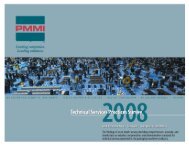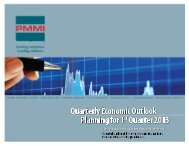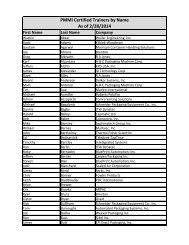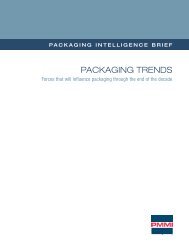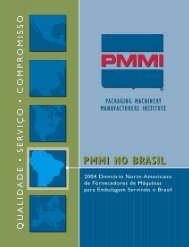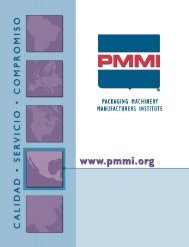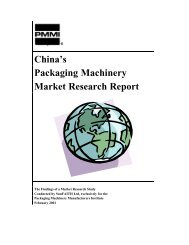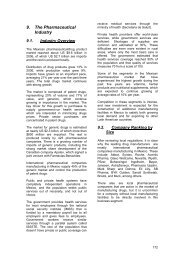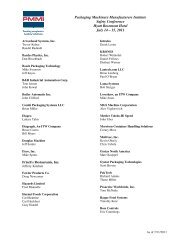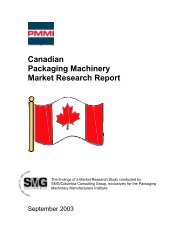Germany Packaging Machinery Market Research Report - PMMI
Germany Packaging Machinery Market Research Report - PMMI
Germany Packaging Machinery Market Research Report - PMMI
You also want an ePaper? Increase the reach of your titles
YUMPU automatically turns print PDFs into web optimized ePapers that Google loves.
Material recycling of packaging —<br />
Private end-consumer (data from Dec. 1999)<br />
1991 1994 1996 1997 1998 2000<br />
Consumption quota in %<br />
Glass 53.7 70.1 80.8 83.3 84.8 85.9<br />
Sheet metal 34.2 58.1 76.7 83.7 83.3 84.4<br />
Aluminum 5.2 30.4 72.4 77.8 67.4 69.6<br />
Plastics 3.2 52.6 62.4 66.6 70.7 70.4<br />
Paper 28.3 57.4 71.4 78.2 84.7 86.3<br />
Compounds for beverages 0.0 40.6 58.0 61.6 67.6 67.9<br />
(Source: Data of the environment 2000 of the Federal Environment Office)<br />
5.3 COMPULSORY DEPOSIT<br />
The discussion about the possible introduction of a compulsory deposit for nonreturnable packaging<br />
has dominated the whole packaging industry for years.<br />
The VVO (Verpackungsverordnung, packaging ordinance), passed in 1991, took into account the major<br />
sector of beverage packaging. In this connection the issue of the share of returnable and nonreturnable<br />
beverage packaging was addressed for the first time. Minimum quotas were set for the use of returnable<br />
beverage packaging in <strong>Germany</strong>, whereby the proportion of returnable packaging was fixed at a<br />
minimum of 72%; accordingly, the proportion of nonreturnable packaging was limited to a maximum<br />
of 28%. The handling of empty beverage packages, especially of empty nonreturnable packages, was<br />
also regulated by the VVO. Each manufacturer or distributor is responsible for taking back its own<br />
empty, used packaging. Exceptions from this responsibility are possible, providing that an areawide,<br />
consumer-orientated collection system exists to carry out the collection. That was why the Duale<br />
System Deutschland (DSD) was founded in 1990. Apart from the quota and legal restraints already<br />
mentioned, the VVO also provides for a compulsory deposit on nonreturnable packaging in the event<br />
that the target of 72% of returnable packages is not met. The quota is evaluated every year by the GVM<br />
and made available to the German Ministry for the Environment. The quotas are then published in the<br />
Bundesanzeiger.<br />
Before an initial nonobservance of the quota can lead to introduction of the compulsory deposit, a<br />
survey is carried out. Only when this survey proves that the requirements were not met, and official<br />
notice is given, is the compulsory deposit imposed after a delay of six months. In 1997, <strong>Germany</strong> failed<br />
for the first time to achieve the minimum quota of 72% returnable packaging. The exact figure of<br />
71.35% was officially published in the Bundesanzeiger on January 21, 1999.<br />
According to the latest Consumer Scan of the GfK (Gesellschaft für Konsumforschung), the proportion<br />
of returnable packaging in <strong>Germany</strong> in 2001 fell to only 60.2%. This survey is an important early<br />
indicator of packaging developments in <strong>Germany</strong> and provides a relatively precise picture of the actual<br />
developments in returnable and nonreturnable packaging. Based on current regulations, a compulsory<br />
deposit of 0.25 € on a nonreturnable package in all beverage segments will have to be introduced at the<br />
latest in autumn 2002. The process of introduction of the compulsory deposit according to the VVO<br />
starts with the appellate administrative court in Berlin, which is currently hearing objections from<br />
opponents of the compulsory deposit.



